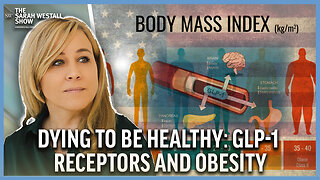Premium Only Content

Keto Diets Episode 1
In today's program we are going to share the science behind the keto diet and address the nuances and considerations as to whether or not this is the right plan for you.
Before we get into what the keto diet is lets make sure we understand the background of ketosis and how our body uses energy.
Metabolism is a group of chemical reactions that take place within the body’s cells for the use of energy.
It is essentially the body’s process of converting food into energy to be utilized in our muscles, nerves, cells, breathing, digestion and circulation of the blood.
Our bodies typically use glucose as energy, which comes from carbohydrate. This comes from things like fruits, veggies and grains.
The body either uses the glucose (simple sugar), or glycogen, the stored form of glucose in the liver as our main source of energy. Glucose travels into the cells by way of insulin the bodies storage hormone, so it can be used for energy production there.
When we decrease the amount of carbohydrate in our diet our insulin levels reduce and the amount of available energy via glucose is also reduced.
So the body needs to turn to a different source of energy, triggering an increased delivery of fatty acids to be used through the liver for fuel.
These fatty acids are called triglycerides which are trapped within your fat cells, until called upon for energy.
This is why nutritional plans like the adkins diet have become so popular for weight loss as they trigger the body's use of fat for energy.
Some of those fatty acids get turned into ketones, or organic acid compounds. Ketosis is the metabolic state where the bodies glucose levels become so low that it switches over to fat stores releasing ketones.
A Ketogenic diet is essentially a metabolic switch from using glucose as the body’s main energy source to burning body fat and ketones.
It is a high fat, moderate protein, low carbohydrate food plan which consists of: 60-75% fat, 15-30% protein, 5-10% carbohydrates.
As the body adapts or becomes more comfortable using fat and ketones we become more efficient at employing these fuel sources for our energy needs.
Basically we become more efficient at oxidizing fat. This has its advantages from a metabolic standpoint.
Some of the advantages include a reduction in inflammatory markers assoicated with metabolic disease.
Some of the basic biomarkers include lowered triglycerides and LDL levels, a decrease in insulin resistance resulting in improved blood sugar regulation, and an upregulation in hormone sensitivity reducing stress on the body.
-
 1:14:34
1:14:34
Michael Franzese
6 hours agoWhat's Behind Biden's Shocking Death Row Pardons?
52K32 -
 9:49
9:49
Tundra Tactical
5 hours ago $0.40 earnedThe Best Tundra Clips from 2024 Part 1.
32.3K4 -
 1:05:19
1:05:19
Sarah Westall
5 hours agoDying to Be Thin: Ozempic & Obesity, Shedding Massive Weight Safely Using GLP-1 Receptors, Dr. Kazer
39.7K9 -
 54:38
54:38
LFA TV
1 day agoThe Resistance Is Gone | Trumpet Daily 12.26.24 7PM EST
30.7K6 -
 58:14
58:14
theDaily302
14 hours agoThe Daily 302- Tim Ballard
36.3K1 -
 13:22
13:22
Stephen Gardner
8 hours ago🔥You'll NEVER Believe what Trump wants NOW!!
86.5K218 -
 54:56
54:56
Digital Social Hour
1 day ago $1.35 earnedDOGE, Deep State, Drones & Charlie Kirk | Donald Trump Jr.
46.1K4 -
 DVR
DVR
The Trish Regan Show
9 hours agoTrump‘s FCC Targets Disney CEO Bob Iger Over ABC News Alleged Misconduct
52.5K34 -
 1:48:19
1:48:19
The Quartering
10 hours agoElon Calls White People Dumb, Vivek Calls American's Lazy & Why Modern Christmas Movies Suck!
135K104 -
 2:08:42
2:08:42
The Dilley Show
11 hours ago $4.38 earnedH1B Visa Debate, Culture and More! w/Author Brenden Dilley 12/26/2024
117K25